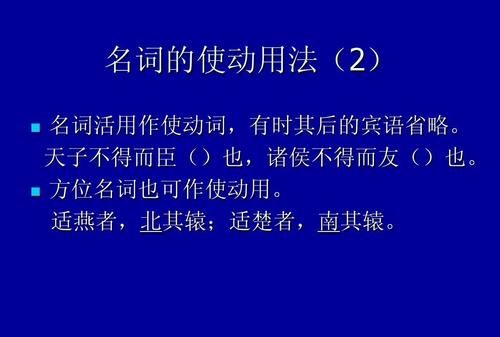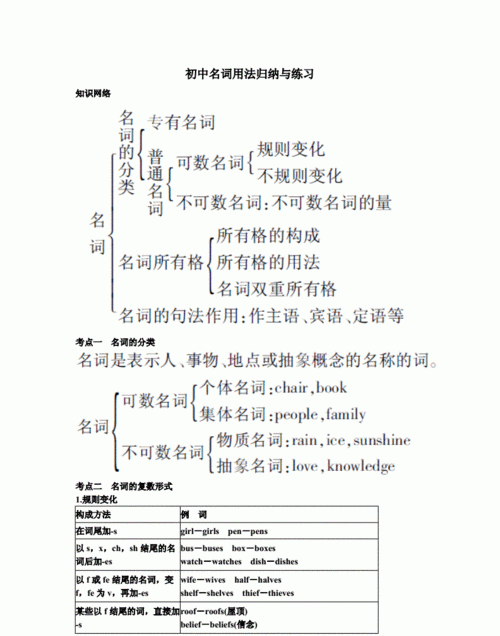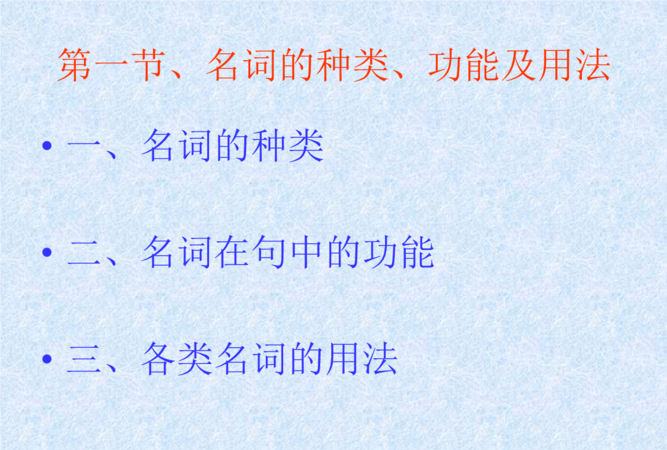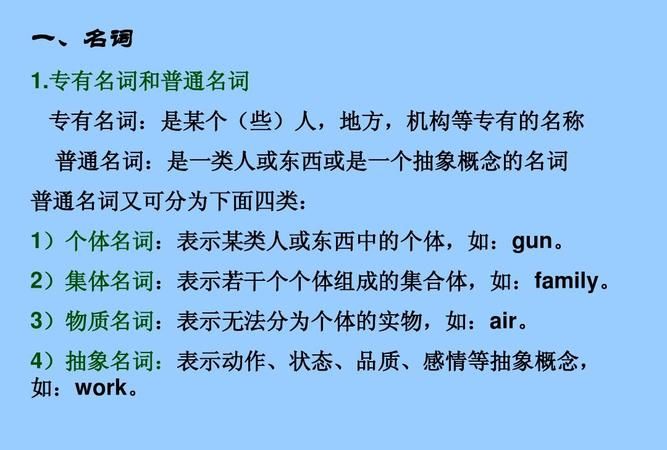本文目录
什么是英语名词用法有哪些单词
英语名词是英语学习者的一个重要学习内容。英语名词的数一直是英语语法研究中一个不可回避的话题。下面是我整理的什么是英语名词,欢迎阅读。
什么是英语名词
名词是表示人,事物,地点或抽象概念的名称。是词性的一种,也是实词的一种,是指待人、物、事、时、地、情感、概念等实体或抽象事物的词。名词可以独立成句。在短语或句子中通常可以用代词来替代。
例如 desk 桌子 time 时间 life 生活 book 书本 room 房间 honesty 诚实 worker 工人 pencil 铅笔 computer 计算机
名词的分类
按意义分类
1.专有名词
表示具体的人,事物,地点,团体或机构的专有名称(第一个字母要大写)。 例:China(中国)、Asia(亚洲)、Beijing(北京)、the People’s Republic Of China(中华人民共和国)。
专有名词如果是含有名词短语,则必须使用定冠词the。如:the Great Wall(长城)。
姓氏名如果采用复数的形式,则表示该姓氏一家人(复数含义)。如:the Greens(格林一家人)。
2.普通名词
表示某些人,某类事物,某种物质或抽象概念的名称。例如:teacher老师、tea茶、reform改革。
普通名词又可进一步分为五类:
(1)个体名词(Individual Nouns):表示单个的人和事物。如car(汽车)、room(房间)、 fan(风扇)、photo(照片)
(2)集体名词(Collective Nouns):表示一群人或一些事物的名称。如 people(人们)、family(家庭)、army(军队)、government(政府)、group(集团)
(3)复合名词(Compound Nouns):两个或两个以上名词连在一起构成的名词。如passerby(过路人)、brother-in-law(内兄)
(4)物质名词(Material Nouns):表示物质或不具备确定形状和大小的个体的物质。如 fire(火)、steel(钢)、air (空气)、water(水)、milk(牛奶)
(5)抽象名词(Abstract Nouns):表示动作,状态,品质或其他抽象概念。如 labor( 劳动)、health(健康)、life (生活)、friendship(友情)、patience(耐力)
按是否可数分类
名词又可分为可数名词(Countable Nouns)和不可数名词(Uncountable Nouns)
1. 不可数名词
不可数名词是指不能以数目来计算,不可以分成个体的概念、状态、品质、感情或表示物质材料的东西;它一般没有复数形式,只有单数形式,它的前面不能用不定冠词a / an。抽象名词,物质名词和专有名词一般是不可数名词。如 milk(牛奶),bread(面包),coffee(咖啡)等。
2. 可数名词
可数名词是指能以数目来计算,可以分成个体的人或东西,因此它有复数形式。如cup(杯子),cat(猫)等。
英语名词用法
1、英语名词可分专有名词和普通名词两大类:
1、专有名词是个别的人、地、物、团体、机构等的专用名称。
专有名词中实词的第一个字母要大写。
如:Beijing, Tom, the People’s Republic of China(中华人民共和国)
专有名词如果是含有普通名词的短语,则必须使用定冠词the。如:the Great Wall(长城)
姓氏名如果采用复数形式,则表示该姓氏一家人(复数含义),如:the Greens( 格林一家人)。
2、普通名词是许多人或事物的共有名称。如:pupil, family, man, foot.
普通名词又分为可数名词和不可数名词。
▲可数名词是可以用简单的数词进行计数的名词,如: box, child, orange;
▲不可数名词是不可以用简单的数词进行计数的名词。如:water, news, oil, population,
information .
2、英语可数名词的单复数:英语可数名词有单数和复数两种形式。
1、名词由单数变复数的基本方法如下:
①在单数名词词尾加s。如:map → maps,boy→ boys,horse→ horses, table→ tables. ②s,o,x ,sh,ch结尾的词加es.如:class→classes, box→boxes, hero→heroes, dish→dishes, bench→benches.
[注]:少数以o结尾的词,变复数时只加s。如:photo→photos, piano→pianos.
③以辅音字母加y结尾的名词,变y为i,再加es。如:family→families, city→cities, party→parties.
④以f或fe结尾的名词,变f或fe为v,再加es。如:shelf→shelves, wolf→wolves, life→lives, knife→knives.
2、不规则变化:man→men, woman→women, sheep→sheep,tooth→teeth, fish→fish, child
→children, ox→oxen, goose→geese
不可数名词一般没有复数形式,说明其数量时,要用有关计量名词。如:a bag of rice→two bags of rice, a piece of paper→three pieces of paper, a bottle of milk→five bottles of milk.
3、名词所有格:
1、 名词所有格表示所属关系,相当于物主代词,在句中作定语、宾语或主语。其构成法
如下:
(1)表示人或其它有生命的东西的名词常在词尾加’s。如:Childern’s Day(儿童节), my sister’s book(我姐姐的书)
(2)以s或es结尾的复数名词。只在词尾加’。如:Teachers’ Day(教师节)
(3)有些表示时间、距离以及世界、国家、城镇等无生命的名词,也可在词尾加’s. 如: newspaper(), break(), population(中国的人口).
(4)无论表示有生命还是无生命的东西的名词,一般均可用介词of短语来表示所有关系。
如:
a fine daughter of the Party(党的好女儿).
2、[注解]:
① ‘s还可以表示某人的家或者某个店铺,如:my aunt’s(我阿姨家), the doctor’s(诊所) ② 两人共有某物时,可以采用 A and B’s 的形式,如:Lucy and Lily’s bedroom(露西和丽丽合住的卧室)
③ “of+名词所有格/名词性物主代词”,称为双重所有格,如:a friend of my father’s(我父亲的一位朋友), a friend of mine(我的一位朋友)
4、名词或代词作主语时和谓语之间的单复数的一致问题:
1、和谓语基本保持单复数的一致,即:主语是可数名词单数或不可数名词时,谓语动词
用单数形式:如:The computer was a great invention.(计算机是个了不起的发明)The (玻璃杯里的水很冷)
2、集体名词(如family, class, team, group, row, police, school等)做句子主语时,
① 如果表示整体概念,则谓语用单数形式,如:Class Three is a very good class.(三班是好班)
② 如果表示其中的所有成员时,则谓语用复数形式,如:Class Three have a map of China.(三班有张中国地图)
3、Chinese, Japanese, fish, sheep, people等表示单个时谓语用单数,表示许多时,谓语用复数。如:There is a sheep in the yard.(院子里有只绵羊) / There are some sheep in the yard.(院子里有一些绵羊)
4、maths, news等虽然有s结尾,但不是复数,
(这个消息令人兴奋)
5、glasses, shoes, socks, trousers, gloves等名词往往用复数形式,故谓语用复数。如: very cheap and I want to take them.(裤子很便宜,我想买)
6、a lot of 后跟名词复数时谓语用复数形式,跟不可数名词时谓语用单数形式。 baseball now.(现在有许多学生在打垒球) (大量的时间花在了那个工作上)(被动句)
7、and 连接两个名词做主语时,谓语原则上用复数,但是两个名词若构成一个整体事物时,谓语则用单数。如:The teacher and his son are picking apples now.(老师和他的儿子在摘苹果) / Fish and chips is very famous food. (鱼和薯条是一种出名的食品)
8、 there be 句型中be的单复数一般由靠近的名词决定。如:in the room.(房间里有一张桌子和四张椅子)
9、用both…and…连接两个事物做主语时,谓语一般用复数。如: .(你和我明天要求都来)
10、主语中含有with的短语时,谓语单复数由with之前的人物决定。如:. (一名妇女带着一个七岁的孩子(当时)就站在路边)
11、either…or…或者 neither…nor…连接两个人物做句子主语时,谓语采用就近原则。如:(要么是你对,要么是他对。/你和他有一个人是对的) / Neither you nor going there.(你和我都不打算去那里)
12、表示一段时间或长度概念的复数名词做主语时,谓语一般用单数。a short time.(两个月不是个短时间)(距离).(两千千米是相当长的一段距离)
13、主语中含有half of… / (three quarters)of… / all (of) the ….等词语时,谓语的单复数由名词确定,如:Over three quarters of the information on the Internet is in English.(因特网上四分之三以上的信息是用英语写的) / A third of the students were playing near the lake.(学生的三分之一(当时)正在湖边玩耍) / All of the water in these rivers has been polluted.(这些河流中的水已经被污染了)(被动句)
但是,population一词又有特殊情况: What’(中国人口是多少?)(句子用单数) / Three quarters of the in this city are Arabs(阿拉伯人).(这个城市四分之三的人口是阿拉伯人)(句子用复数)
5、部分名词用法辨析:
1、sport、game、match、race 的区别:sport通常指“户外运动”,以锻炼为主,概念较大;game意思是“运动、比赛”,不管户内户外还是脑力体力,指以胜负为主的运动;match意为“竞赛、比赛”,多指正式比赛;race主要表示“赛跑、赛马、赛车”。如:(全世界的人都喜爱运动) / The 2008 Olympic will be held in Beijing.(2008奥运会将在北京举行)(被动句) / Our school football team won the league (联赛).(我们学校足球队取得了联赛冠军) / They (汤他们很棒,赢得了划艇比赛)
2、festival、holiday、vacation的区别:festival“节日”,指喜庆的日子或持续一段时间的文娱活动;holiday(假日、休息日),指法定假日或风俗习惯,复数可以表示一个较长的假期;vacation“假期”,指学习或工作中一段长时间的休息。如:The Shanghai Television (上海电视节将在下个月举行)most people do not work.(星期天是个假日,多数人不工作) / What are you going to do (在暑期你打算做什么事情?)
3、journey、tour、trip、travel的区别:journey指在陆地上(或海上或空中)进行的长途旅行,不知终点,含有辛苦的意思;tour指途中作短期逗留的巡回旅行,强调游览多处,常用来指观光等;trip通常指往返定时的短途旅行,如出差度假等;travel多指长期或长途的观光旅行,尤其指到国外,没有明确目的地,也作不可数名词,指旅行这一行为。如:He made up his mind to make the to Dunhuang.(他拿定主意要去敦煌旅行)/ He (他步行观光去了)last yeaar.(去年他去了上海好几次) / Did you go to Santiago(圣地亚哥) during your (旅行期间你去圣地亚哥了吗?) / through thick forests is dangerous.(在密林里边穿行是很危险的)
4、sound、noise、voice的区别:sound指各种声音;noise主要指“噪音”;voice指人的“嗓音”。如:The noise of the street kept me awake in the night.(街上的喧嚣声让我彻夜难眠) / All of a sudden there was the sound of shots and a cry.(突然间传来几声枪响和一声尖叫) / The singer has lost her ringing voice as a result of a bad cold.(因为感冒的缘故,这个歌唱家失去了她银铃般的嗓音)

英语中名词的用法
25个英语集合名词的用法
13. jury的用法
jury的意思是“陪审团”“(比赛的)评判委员会”,为集合名词;用作主语时,谓语动词可用单数(视为整体)或复数(考虑其个体)。如:
The jury is [are] considering its verdict. 陪审团正在考虑裁决。
The jury is [are] about to announce the winners. 评委会即将宣布优胜者。
14. majority的用法
(1) the majority表示“大多数”时,为集合名词;单独用作主语时,其谓语可用单数(视为整体)或复数(考虑其个体)。如:
The majority has [have] seen the film. 多数人看过这部电影。
The majority was [were] in favour of banning smoking. 大多数人支持禁烟。
但是若单独用的 the majority后跟有复数表语,则谓语通常要用复数。如:
The majority are young people. 大多数是年轻人。
(2) 用于“the majority of+复数名词”且用作主语时,其谓语动词通常用复数。如:
The majority of our employees are women. 我们的雇员大多数是女性。
The majority of men earn their living by manual labour. 大多数人是以体力劳动为生。
但用于单数也是可能的(即将主语视为一个整体)。如:
The majority of students were [was] indifferent to the political meeting. 大多数学生对政治集会漠不关心。
(3) 按传统语法,the majority of只用于修饰可数名词复数或具有复数意义的集合名词,但在现代英语中也可用于修饰不可数名词,此时若用作主语,谓语动词用单数。如:
The majority of my work is done in the office. 我的大部分工作是在办公室里干的。
The vast majority of alcohol metabolism occurs in the liver. 酒精的代射主要在肝脏。
(3) the majority of习惯上带定冠词,有时也可用不定冠词。如:
A majority of visitors have arrived. 大多数参观者已经到了。
A clear majority of voters were in favour of the motion. 绝大多数选民赞成这一动议。
A [The] majority of people seem to prefer TV to radio. 大部分人似乎喜欢看电视而不喜欢听收音机。
15. management的用法
(1) management的意思是“管理层”“管理人员”“资方”,为集合名词;用作主语时,谓语动词可用单数(视为整体)或复数(考虑其个体)。如:
The management is not responsible for articles left in customers’ cars. 管理人员对于留在顾客车内的东西概不负责。
The management are looking for ways of improving productivity. 管理部门正在设法提高生产率。
The management is [are] having talks with the workers. 资方正在与工人谈话。
有时其前可以不用冠词。如:
Management [The management] is [are] considering closing the factory. 主管部门正在考虑把工厂关闭。
(2) 若只是表示“管理”,则表示单数意义。如:
Poor management has sunk the project. 管理不善导致了这个项目失败。
School management is often too detached from the classroom. 学校管理往往太脱离课堂。
16. military的用法
military的意思是“军队”“武装力量”,通常要连用定冠词;用作主语时,谓语动词通常用复数,但有时也用单数。如:
As the police could not keep order in the city, the military were called in to help. 由于警察无法维持城里的秩序,军队被召去加以协助。
The military does not have the weapons it needs to defeat the rebels. 军方没有击败叛军所需的武器。
17. minority的用法
(1) 意为“少数”“少数人”,用于a minority且用作主语时,谓语动词通常用复数,但有时也用单数。如:
Only a tiny minority hold such extreme views. 只有极少数的人持这种极端的观点。
Unfortunately, a small minority want to spoil everyone else’s enjoyment. 很遗憾,少数几个人想破坏其他所有人的兴致。
The nation wants peace; only a minority want(s) the war to continue. 全国人民要和平,只有少数人希望继续打仗。
(2) 用于a minority of,后接复数名词,用作主语时,谓语动词可用单数(视为整体)或复数(考虑其个体)。如:
Only a minority of people support these new laws. 只有少数人支持这些新法令。
A minority of children are sexually active before they are in their teens. 少数孩子在十几岁前有性行为。
Only a small minority of students is [are] interested in politics these days. 目前只有极少数学生对政治感兴趣。
18. nation的用法
(1) 表示“国民”“全国人民”时,为集合名词;但用作主语时,谓语动词可用单数(视为整体)或复数(考虑其个体)。如:
The nation was at fever pitch in the days leading up to the election. 大选前几天,全国处于狂热的兴奋之中。
The whole [entire] nation was [were] watching the developments of the incident. 全国人民都在关注着此事的进展。
(2) 若表示“国家”,则表示单数意思。如:
The nation was reunited and slaves were set free. 国家重新统一,奴隶获得了自由。
The nation is in danger of falling into anarchy. 那个国家有进入无政府状态的危险。
19. personnel的用法
(1) 表示“全体人员”时,为总称名词,虽为单数形式,但表示复数意义;用作主语时,谓语要用复数。如:
Our personnel are very highly trained. 我们的人员素质很高。
Army personnel are not allowed to leave the base. 军事人员不准离开基地。
(2) 表示“人事部门”时,其用法值得注意——此时它是不可数名词,不连用不定冠词,也不用复数形式,但它用作主语时谓语动词却可用单数或复数。如:
Personnel has [have] lost my tax forms. 人事部门把我的税收表格弄丢了。
Personnel is [are] organizing the training of the new members of staff. 人事部门正在组织新雇员的培训。
20. population的用法
(1) 表示某地区、城市、国家等的“全体居民”“人口”,或表示聚居于某地区的“一群或一类的人或动物”等,为集合名词,既可表示单数意义(视为整体)也可表示复数意义(考虑其个体)。如:
Most of the population has [have] fled. 大部分居民都逃走了。
A tiny fraction of the population never vote [votes]. 很少一部分人从不投票。
What percent of the population read [reads] books? 识字的人占人口总数的百分之几?
Half the world’s population doesn’t [don’t] get enough to eat. 世界有一半人口没有足够的食物吃。
但是,在某些特定语境中,要注意区分其单数意义与复数意义。如:
One half of the world’s population are Asians. 世界人口有一半是亚洲人。(由于其后的表语是复数,所以系动词以用复数为宜)
The population of Scotland was eight times as large as that of Cornwall. 苏格兰的人口是康沃尔人口的八倍。(此句用单数谓语,因为主语的概括性比较强)
(2) 如果population本身为复数,其后的谓语自然要用复数。如:
Insect populations fluctuate wildly from year to year. 昆虫数量每年变化很大。
Whole populations of natives were wiped out in order that civilisation might advance. 为了文明得以前进,整批整批的土著被消灭了。
(3) 其前不能用数词修饰,也不能与many, few之类的词连用,但在说明数量多少时可用large, high, small等来说明。如:
China’s population is by far the largest of any country. 中国是全世界人口最多的国家。
In 1900 the population of London was higher than it is now. 1900年,伦敦的人口比现在多。
虽然不直接受数量修饰,但受“per+数词”来修饰。如:
the number of live births per 1,000 population 每1000人中的活产婴儿数目
(4) 要表示某地拥有多少人口,一般用“have a population of+基数词”这样的结构。如:
Japan has a population of about a hundred million. 日本人口约有1亿。
若要打听某地的人口数,可用what或how large。如:
How large [What] is the population of China? 中国有多少人口?
21. public的用法
表示“公众”,为集合名词,其前要用定冠词;用作主语,谓语可用单数(侧重整体)或复数(侧重个体)。如:
Give the public what it wants [they want]. 应满足公众的要求。
The public is [are] requested not to walk on the grass. 请大家不要在草地上行走。
The public has [have] a right to know what is contained in the report. 民众有权了解报告的内容。
比较下面两句:
The public is the best judge.=The public are the best judges. 公众是最好的判断者。
22. staff的用法
(1) staff表示“全体人员”,是集合名词,a staff 不是指“一个人员”,而是指某一个单位的“全体人员”;two staffs不是指“两个人员”,而是指某两个单位的“全体人员”。要表示 “一个职员”“一个工作人员”,可说成a staff member或one of the staff。如:
On every trip a staff member brings musical instruments. 每一次旅行时,一个工作人员都会携带乐器。
但如果是复数,则其中的members可以省略。如:
Staff (members) are conversant with the issues. 职工对这些问题很有经验。
(2) 用作主语时,其谓语动词可用单数(视为整体)或复数(考虑其个体)。如:
The school’s teaching staff is [are] excellent. 学校师资很不错。
Over half of the staff is female. 半数以上的职工是女性。
Most of our sales staff now work on line. 我们的销售人员现在大多在线开展业务。
注意,类似下面这样的句子,staff前面没有冠词:
Staff are expected to start work punctually at 8.30. 工作人员必须在8点半准时开始工作。
Staff are not permitted to make personal phone calls except in an emergency. 除了有急事,员工不允许打私人电话。
(3) 若语义需要,其前可用some, many, most, all等修饰。如:
Many hospital staff have to work unsocial hours. 许多医务人员必须在非正常时间上班。
All the staff wish you weren’t leaving so soon. 所有的工作人员都希望你不要这么快就离开。
有时还可直接用数词修饰。如:
Six more staff got the chop last week. 上个星期又有6名员工被解雇。
There are plans to axe 2600 staff. 有计划要解雇2600名员工。
(4) 表示“是……的职员”“在……供职”,其前通常用介词on。如:
He’s on the staff of the college. 他在那所大学供职。
23. team的用法
(1) 作为集合名词,用作主语时,其谓语动词根据情况可用单数(侧重整体)或复数(侧重个体)。如:
Which team is the best? 哪个队打得最好?
The football team are having a rest. 足球队队员们在休息。
(2) a team of后接复数名词,表示“一组(群,批) ……”。如:
The exam questions are set by a team of experts. 考试题是由一个专家组命制的。
这类结构若用作主语,其后的谓语动词可用单数(侧重整体)或复数(侧重个体)。如:
A team of divers was sent down to examine the wreck. 派了一个潜水队去对沉船进行检查。
A team of volunteers were putting up posters. 一批志愿者在张贴海报。
(3) 表示某人在某个队或是某个队的队员,其前可用介词on或in。如:
They are in [on] the same football team. 他们是同一个足球队的(成员)。
24. troop的用法
(1) 表示“军队”“部队”,习惯用复数形式;若用作主语,谓语也用复数。如:
Rebel troops have captured the city. 叛军夺取了该城。
Troops were used to put down the rebellion. 动用了军队镇压叛乱。
(2) 有时可代替soldiers表示“士兵”,但它一般不与具体数字(尤其是较小的数字)连用,如“两个士兵”一般不能说成two troops,可说two soldiers。不过它可以与较大的数字以及不确定的数目连用。如:
many troops 许多士兵
five hundred troops 500士兵
thousands of troops 数千士兵
(3) 若用于名词前作定语,则用单数。如:
The troop withdrawal is scheduled to begin the day after the ceasefire. 部队撤离安排在停火后的一天开始。
(4) 用于a troop of,后接复数名,表示“一群”“大量”“许多”等,用作主语时,其谓语动词根据情况可用单数(侧重整体)或复数(侧重个体)。如:
A troop of guests was moving towards the house. 一群客人向那房子走去。
A troop of boys were playing at the edge of a pond. 一群孩子正在池边玩耍。
25. workforce的用法
workforce表示“工人总数”或“职工总数”,是集合名词;用作主语时谓语可用单数(视为整体)或复数(考虑其个体)。如:
The workforce in this area is well-educated and very reliable. 这个地区的劳动力教育程度高,而且非常可靠。
Our workforce are completely dependable. 我们的工作人员的能力完全可靠。
;


以上就是关于名词的全部用法 ,什么是英语名词用法有哪些单词的全部内容,以及名词的全部用法 的相关内容,希望能够帮到您。
